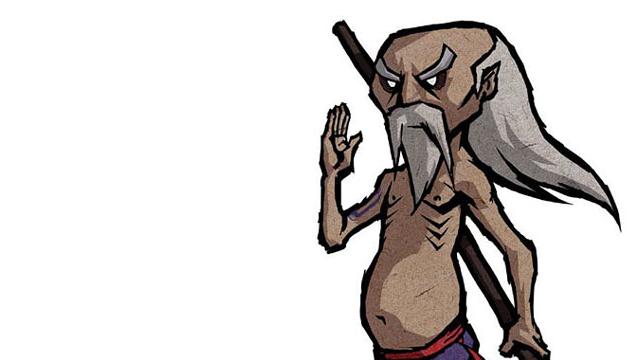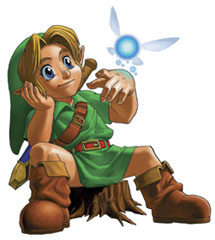
Generally old people aren’t terribly exciting. Sorry, oldies, but it’s just true. Even when generic TV sitcoms aimed at ten year olds try and portray old people as knowledgeable and exciting, i.e. a group of kids go to an old folks’ home and learn so much from these fascinating elderly people, it only shows them to be more out of date and immobile than we originally assumed. Sorry Recess and Sabrina the Teenage Witch, you did try.
But old people don’t have to be boring, do they? In those kids’ shows I used to watch, they never left the care home and knitted all the time. Hardly revolutionizing the image of old people, is it? Games don’t do a much better job either, where old people are either innocuous, utterly delusional nutters or occasionally get the coveted role of injured but wise sensei who can teach our young, plucky hero how to wield a sword.
And that’s really your lot if you’re an aspiring elderly video game character. Just like in Hollywood, there’s little room for geriatrics in the spotlight and the aged character should turn to independent games, the theatre or even books in which they could play a haunting, ghostly figure that warns the lead of his impending doom. Such is life.
This also stems from the wider issue in gaming that no one actually ages. Despite being “part of the family” for 25 years, Mario still looks as young as he did back in his original adventures on the N64, SNES and even the arcade. Likewise, Samus, Donkey Kong and Wario have yet to show any signs of aging despite their lengthy careers. In a sense you can see the point of game developers keeping their characters young; if Hollywood is managing to do it with real people, why shouldn’t they?

The issue is muddied further by Nintendo’s penchant for leaping through the timelines of series willy-nilly and passing on mantles to new generations of characters. Unlike in most forms of media, where sequels to a story continue on in a linear fashion, gaming seems more than content creating a new story and fitting it in anywhere it might fit chronologically. Because of this, we see series evolve and grow for decades without the story ever really being pushed along.
Two prime examples of this are the Zelda and Metroid franchises. In the former we see Link being born again in nearly every game in the series, faced with a new but all-too-familiar evil as he must yet again save the kingdom of Hyrule. This allows Nintendo to drastically change the style and tone of the franchise regularly but we never really get the opportunity to grow or bond with any particular interpretation of the character because we’ll have the next incarnation thrust upon us sooner or later.
With Metroid we do follow a single character throughout several adventures but the order of her journeys greatly differs from the release order of the games. Despite being released shortly after the original Metroid, its immediate sequel, Metroid II: Return of Samus, chronologically occurs many years after the events of the first game. Many other games in the series follow a similar pattern of being out of sync and overall we have seen very little of Samus physically aging or evolving as a character.
So why can’t this only encourage designers to make the bold decision to portray their characters older than we traditionally associate them with? A Metroid game featuring Samus with failing equipment in a dystopian future or a Zelda featuring Link as a battle scarred warrior who is tortured by the horror of his past lives would both be exciting and a real change of pace for their relevant series. With the freedom to ignore chronology and create one single installment that truly pushed the boundaries of not only the franchise but gaming as a whole, you’d think that someone would have taken the leap properly.
Unfortunately, very few games dare to place a veteran character in the lead role, and instead we get another white, muscular soldier with an axe to grind, or a carbon copy of the characters we already know far too well. Perhaps that will change over time, or else our game heroes will reside, permanently, in a fountain of youth.




 ShareThis
ShareThis







Two words: Solid Snake. :^)
I know this is a Nintendo-centric site, but if you want a game to explore aging (premature aging, even) you need look no further than Metal Gear Solid 4. If you want to see a hero age, get pushed beyond his limits, and be forced to deal with his own mortality, his swan song is well worth the price of a PS3. (It’s why I got one :^)
I’m also a little surprised that Ocarina of Time wasn’t mentioned. Granted, child Link and teen Link aren’t “old”, but the shock that hits Link when he realizes he has aged 7 years is not only a plot point in dialogue, but affects gameplay as well – many items are usable only by a child or an adult.
I haven’t played much D&D, but it has an interesting set of mechanisms for dealing with aging characters.
Over on PC/Mac, Alice (as in Alice in Wonderland, but not the recent movie tie-in) deals with a grown-up Alice damaged by childhood trauma.
I’m not picking on this article; quite the opposite in fact. The titles I’ve mentioned are awesome, in no small part because of the way they deal with heroes affected by age and/or experience. Developers, if you’re listening: let’s see more of this stuff!
I knew someone was going to bring up MGS4 but I couldn’t figure a good way to work it into my article. I had sections written about it but they felt incongruous to the piece so I left them out. I of course new someone would bring it up in the comments so I’m glad it’s happened :D
MGS4 was the first game in the series I’d ever played and it was seriously impressive, even though I haven’t had much time with the game. The main thing I was going to point out was that I decided to try and bolt across the terrain to get the other side of a road and when I slammed the control stick forward, expecting him to dash, Old Snake just started waddling awkwardly like he’d just been soiled himself. I thought that was a neat inclusion of elderly attributes towards gameplay.
So yes, imagine that in the article. Somewhere.
Glad to hear it! Again, not a criticism of the article. I’d love to see more games exploring older heroes. An old Link or Samus, as you mentioned, would be particularly touching.
Metroid: Other M has proven to me that personal stories of these iconic characters can indeed work. Having Link or Mario or Olimar finally speak and start exposing some of their character, including flaws and frailties that might come with age, could make for a phenomenal story.
…Now there’s an idea. Old Olimar, haunted by the ghosts of the dozens of Pikmin he commanded into death…
The original Pikmin did have an interesting narrative to me because the actual story of Olimar was told through his journal entries. It was the subtle and moving references to his wife and children back home that were hidden among the Pikmin and Ship reports that really gave that game a soul.
But then again, Resident Evil: Pikmin Chronicles? I’m a little bit intrigued :P